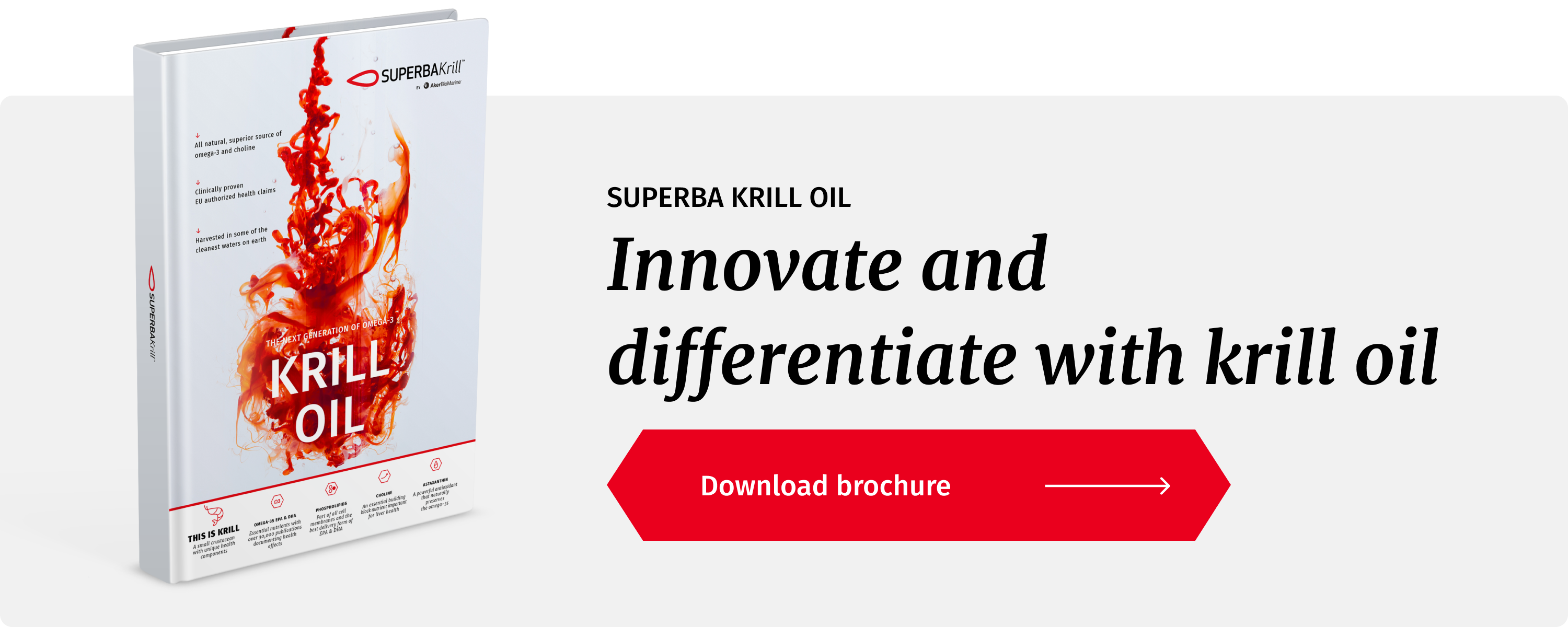There is no question that omega-3s eicosapentaenoic acid (EPA) and docosahexaenoic acid (DHA) are essential for overall health and that krill oil is becoming a preferred omega-3 option for consumers. Krill oil is interesting because its fatty acids are largely bound to phospholipids, which are integral to the body and its cell membranes. In addition to its unique phospholipid advantage, krill oil contains other powerful nutrients such as astaxanthin and choline.
The Importance of Choline
Choline is an organic, water-soluble compound that is neither a vitamin nor a mineral. It is often grouped with the vitamin B complex due to its similar properties and functions. It is naturally found in egg yolk, chicken liver, salmon, soybeans and more, as well as in krill oil.
Choline is crucial for the body for many things such as cell structure, function, and signalling, and like omega-3 fatty acids, choline contributes to cardiovascular, liver and cognitive health. Choline is used by the body to produce acetylcholine, a neurotransmitter that is involved in neuronal networks associated with memory and muscle function.
Furthermore, it has been shown to positively impact brain development as well as reduce the risk of liver, breast and colorectal cancers. Choline was officially recognized as a conditionally essential nutrient by the Institute of Medicine in 1998. (Source)
Choline Deficiency
Although small amounts of choline can be made in the liver, the majority needs to come from our diets, similar to omega-3s. According to the Institute of Medicine, an adequate daily intake of choline is 550 mg for men and 425 mg for women (rising to 450 mg for pregnant women and 550 mg for women who are breastfeeding).
Experts believe that vegetarians, vegans and those who over-consume alcohol are more inclined to be at risk for choline deficiency, therefore supplementation for this target group is especially important. Studies show that choline deficiency may increase the risk of developing fatty liver and muscle dysfunction.
Low choline diets are also associated with increased rates of birth defects, which is why choline intake is important during pregnancy. In fact, choline intake in the last two trimesters of pregnancy is correlated with memory function in seven year olds and studies show that choline during pregnancy is needed for brain and cognitive development. (Source)
Choline Levels around the Globe
According to the U.S. Department of Health, more than 90% of the population fails to achieve an intake of choline is 425-550 mg/day. Another study confirmed that nine in ten Americans are deficient in choline. (Source)
Furthermore, in most of the population groups studied in Europe, the average choline intake was below the adequate intake (AI) set by the Institute of Medicine in the USA. (Source)
Choline and Krill Oil
In krill oil, choline is found in the form of phosphatidylcholine (PC), which has been shown to be twelve times better in terms of raising blood choline levels compared to a choline salt.
Although more research is needed to fully understand how genetics, gender, life stage and lifestyle factors influence a person’s choline requirements, krill oil remains a good option to help consumers raise their levels of choline.


